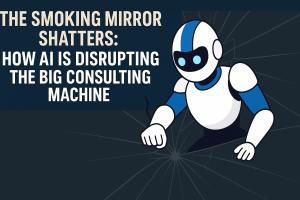AI Disruption Signals Structural Shift in Consulting Industry
KISSIMMEE, FL, UNITED STATES, June 25, 2025 /EINPresswire.com/ -- Agentic artificial intelligence is transforming the traditional consulting model, offering organizations a faster, more cost-effective alternative to expensive research reports and strategic planning services. As generative AI capabilities expand, the foundation of high-dollar consulting engagements is increasingly being challenged.
For years, major consulting firms have relied on premium research deliverables and insider access to maintain dominance across federal and corporate sectors. Strategic frameworks, whitepapers, and PowerPoint-driven advisory services have formed the backbone of six- and seven-figure engagements. However, the rise of advanced large language models, such as GPT-4o and Claude, is enabling organizations to generate tailored strategy documents internally in a fraction of the time.
Many consulting firms now find themselves navigating the same AI disruption they once advised others to approach with caution—while simultaneously monetizing AI-based services. Strategic deliverables that once required large teams and long timelines are now being produced in minutes using secure internal AI models connected to proprietary datasets.
Concerns over inefficiencies and outdated processes are growing. Some organizations report spending hundreds of thousands of dollars on research reports that are outdated upon delivery. In contrast, AI agents are producing real-time insights, including market analysis, threat assessments, and competitive intelligence, at a significantly lower cost.
Beyond the technology shift, structural issues continue to affect industry dynamics. In several instances, operational platforms developed by smaller teams have outperformed larger consulting solutions but failed to receive institutional backing. Reports of idea reappropriation, insider influence, and revolving-door hiring practices between government and consulting firms have further complicated the landscape.
The challenges extend to procurement cycles, where large firms are sometimes involved in shaping solicitation requirements, then later awarded contracts under those same frameworks. Although OCI (Organizational Conflict of Interest) policies exist, frequent transitions between public service roles and private sector consulting have raised concerns about transparency and accountability.
Despite these systemic barriers, some organizations are adapting by building internal AI infrastructures, often referred to as “AI agent farms.” These systems allow agencies and enterprises to generate strategic insights, draft technical documentation, and assess risks—without reliance on external consultants. This shift enhances operational security, reduces costs, and improves agility.
As organizations continue to evaluate the role of AI in strategic operations, a growing number are reconsidering the value of external research and advisory services. With secure, domain-aware models, internal teams can now replicate or even exceed the quality of traditional consulting deliverables.
While large firms maintain influence through established relationships, the mystique surrounding high-cost strategic consulting is diminishing. AI has democratized access to insight generation, offering decision-makers a faster, more scalable, and cost-efficient model.
About ZeroTrusted.ai
ZeroTrusted.ai is a cybersecurity company focused on AI security, privacy, and reliability. Founded by experts with experience across the Department of Defense, Intelligence Community, and Fortune 500 enterprises, the company enables organizations to build secure, in-house AI capabilities for strategic decision-making.

For years, major consulting firms have relied on premium research deliverables and insider access to maintain dominance across federal and corporate sectors. Strategic frameworks, whitepapers, and PowerPoint-driven advisory services have formed the backbone of six- and seven-figure engagements. However, the rise of advanced large language models, such as GPT-4o and Claude, is enabling organizations to generate tailored strategy documents internally in a fraction of the time.
Many consulting firms now find themselves navigating the same AI disruption they once advised others to approach with caution—while simultaneously monetizing AI-based services. Strategic deliverables that once required large teams and long timelines are now being produced in minutes using secure internal AI models connected to proprietary datasets.
Concerns over inefficiencies and outdated processes are growing. Some organizations report spending hundreds of thousands of dollars on research reports that are outdated upon delivery. In contrast, AI agents are producing real-time insights, including market analysis, threat assessments, and competitive intelligence, at a significantly lower cost.
Beyond the technology shift, structural issues continue to affect industry dynamics. In several instances, operational platforms developed by smaller teams have outperformed larger consulting solutions but failed to receive institutional backing. Reports of idea reappropriation, insider influence, and revolving-door hiring practices between government and consulting firms have further complicated the landscape.
The challenges extend to procurement cycles, where large firms are sometimes involved in shaping solicitation requirements, then later awarded contracts under those same frameworks. Although OCI (Organizational Conflict of Interest) policies exist, frequent transitions between public service roles and private sector consulting have raised concerns about transparency and accountability.
Despite these systemic barriers, some organizations are adapting by building internal AI infrastructures, often referred to as “AI agent farms.” These systems allow agencies and enterprises to generate strategic insights, draft technical documentation, and assess risks—without reliance on external consultants. This shift enhances operational security, reduces costs, and improves agility.
As organizations continue to evaluate the role of AI in strategic operations, a growing number are reconsidering the value of external research and advisory services. With secure, domain-aware models, internal teams can now replicate or even exceed the quality of traditional consulting deliverables.
While large firms maintain influence through established relationships, the mystique surrounding high-cost strategic consulting is diminishing. AI has democratized access to insight generation, offering decision-makers a faster, more scalable, and cost-efficient model.
About ZeroTrusted.ai
ZeroTrusted.ai is a cybersecurity company focused on AI security, privacy, and reliability. Founded by experts with experience across the Department of Defense, Intelligence Community, and Fortune 500 enterprises, the company enables organizations to build secure, in-house AI capabilities for strategic decision-making.
Catie Moore
Lifestyles CFL
+1 407-449-2022
email us here
Legal Disclaimer:
EIN Presswire provides this news content "as is" without warranty of any kind. We do not accept any responsibility or liability for the accuracy, content, images, videos, licenses, completeness, legality, or reliability of the information contained in this article. If you have any complaints or copyright issues related to this article, kindly contact the author above.

